Natural Cannabinoids

CBD
cannabidiol
Science:
Cannabidiol (CBD) is a chemical derived from the Cannabis sativa plant, also known as cannabis or hemp, that only contains small amounts of THC(tetrahydrocannabinol), which is the most famous ingredient in cannabis for-which is devoid of psychoactive activity, with analgesic, anti-inflammatory, antineoplastic and chemopreventive activities.
Benefits:
- May relieve pain: The human body contains a specialized system called the endocannabinoid system, which is involved in regulating a variety of functions, including sleep, appetite, pain sensation, and immune system response.
- May reduce symptoms related to some mental health disorders: CBD use has been shown to improve some symptoms related to anxiety disorders. Researchers are currently investigating how CBD may be used to treat other mental health disorders.
- May have neuroprotective properties: Researchers believe that CBD’s ability to act on the endocannabinoid system and other brain-signaling systems may benefit those with neurological disorders. In addition, CBD may be effective for treating seizures related to several health conditions. For example, the prescription CBD product Epidiolex has received FDA approval to treat seizures associated with rare, seizure-causing conditions such as Dravet syndrome.
Cannabidiol (CBD) is a chemical derived from the Cannabis sativa plant, also known as cannabis or hemp, that only contains small amounts of THC(tetrahydrocannabinol), which is the most famous ingredient in cannabis for-which is devoid of psychoactive activity, with analgesic, anti-inflammatory, antineoplastic and chemopreventive activities.
– May relieve pain: The human body contains a specialized system called the endocannabinoid system, which is involved in regulating a variety of functions, including sleep, appetite, pain sensation, and immune system response.
– May reduce symptoms related to some mental health disorders: CBD use has been shown to improve some symptoms related to anxiety disorders. Researchers are currently investigating how CBD may be used to treat other mental health disorders.
– May have neuroprotective properties: Researchers believe that CBD’s ability to act on the endocannabinoid system and other brain-signaling systems may benefit those with neurological disorders. In addition, CBD may be effective for treating seizures related to several health conditions. For example, the prescription CBD product Epidiolex has received FDA approval to treat seizures associated with rare, seizure-causing conditions such as Dravet syndrome.
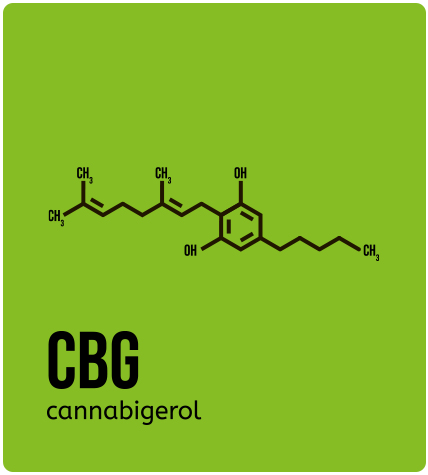
CBG
cannabigerol
Science:
Cannabigerol (CBG) is one of the many chemicals found in cannabis plants. It’s often called the “mother of all cannabinoids” because cannabis would have no high without it. In addition, CBG is considered to be the precursor to other cannabinoids, and this is because CBG-A, the acidic form of CBG, breaks down to form CBG, CBD, THC, and CBC.
CBG and CBD don’t bind to the same receptors in the body and also differ on a molecular level. However, because CBG can bind to the same receptors as THC, it can potentially address issues that pertain to the nervous system, such as glaucoma, migraines, muscle soreness, and inducing appetite.
Benefits:
- Inflammatory bowel disease: CBG seems to reduce the inflammation associated with inflammatory bowel disease, according to a 2013 study.
- Glaucoma: Medical cannabis seems to treat glaucoma effectively, and CBG might be partly responsible for its efficacy. A study published in 2008 suggests that CBG might be effective in treating glaucoma because it reduces intraocular pressure.
- Bladder dysfunctions: Some cannabinoids seem to affect the contractions of the bladder. A 2015 study looked at how five different cannabinoids affect the bladder, concluding that CBG is the most promising Cannabinoid in treating bladder dysfunctions.
- Huntington’s disease: CBG might have neuroprotective properties, according to a 2015 study that looked at mice with a neurodegenerative condition called Huntington’s disease. The study concluded that CBG might show promise in treating other neurodegenerative disorders.
- Bacterial infections: A 2008 study suggests that CBG can kill bacteria, particularly methicillin-resistant Staphylococcus aureus (MRSA), which causes drug-resistant staph infections. These infections can be hard to treat and reasonably dangerous.
- Cancer: A 2014 Source looked at colon cancer in rats and concluded that CBG might reduce the growth of cancer cells and other tumors.
- Appetite loss: A 2016 study suggested that CBG could stimulate the appetite. Appetite-stimulating chemicals could be used to help those with conditions such as HIV or cancer.
Cannabigerol (CBG) is one of the many chemicals found in cannabis plants. It’s often called the “mother of all cannabinoids” because cannabis would have no high without it. In addition, CBG is considered to be the precursor to other cannabinoids, and this is because CBG-A, the acidic form of CBG, breaks down to form CBG, CBD, THC, and CBC.
CBG and CBD don’t bind to the same receptors in the body and also differ on a molecular level. However, because CBG can bind to the same receptors as THC, it can potentially address issues that pertain to the nervous system, such as glaucoma, migraines, muscle soreness, and inducing appetite.
– Inflammatory bowel disease: CBG seems to reduce the inflammation associated with inflammatory bowel disease, according to a 2013 study.
– Glaucoma: Medical cannabis seems to treat glaucoma effectively, and CBG might be partly responsible for its efficacy. A study published in 2008 suggests that CBG might be effective in treating glaucoma because it reduces intraocular pressure.
– Bladder dysfunctions: Some cannabinoids seem to affect the contractions of the bladder. A 2015 study looked at how five different cannabinoids affect the bladder, concluding that CBG is the most promising Cannabinoid in treating bladder dysfunctions.
– Huntington’s disease: CBG might have neuroprotective properties, according to a 2015 study that looked at mice with a neurodegenerative condition called Huntington’s disease. The study concluded that CBG might show promise in treating other neurodegenerative disorders.
– Bacterial infections: A 2008 study suggests that CBG can kill bacteria, particularly methicillin-resistant Staphylococcus aureus (MRSA), which causes drug-resistant staph infections. These infections can be hard to treat and reasonably dangerous.
– Cancer: A 2014 Source looked at colon cancer in rats and concluded that CBG might reduce the growth of cancer cells and other tumors.
– Appetite loss: A 2016 study suggested that CBG could stimulate the appetite. Appetite-stimulating chemicals could be used to help those with conditions such as HIV or cancer.

CBC
cannabichromene
Science:
Cannabigerol (CBC) is considered one of medical research’s “big six” cannabinoids. Unfortunately, it doesn’t get as much attention, but CBC’s benefits are extremely promising.
CBC is non-intoxicating, so it doesn’t produce a euphoric high like THC. It is non-intoxicating because it binds poorly to CB1 cannabinoid receptors in the brain. But CBC binds with other receptors in the body, such as the vanilloid receptor 1 (TRPV1) and transient receptor potential ankyrin 1 (TRPA1), which are linked to pain perception. When CBC activates these receptors, increased levels of the body’s natural endocannabinoids like anandamide are released.
Benefits:
- Cancer: May be a powerful cancer fighter for its interaction with the body’s natural endocannabinoid. CBC also appears to inhibit anandamide uptake, allowing it to remain longer in the bloodstream. A recent study in which tumor growth was initiated in mice (two-stage mouse skin carcinogenesis model) showed cannabinoids might effectively inhibit inflammation and tumor growth.
- Pain and inflammation: CBC has been shown to block pain and inflammation associated with collagen-induced osteoarthritis. In addition, in a recent animal study, CBC, in combination with THC, had a significant anti-inflammatory response; the two cannabinoids produced a much greater effect on inflammation than by themselves.
- Brain cells: In a 2013 mouse study, CBC positively affected neural stem progenitor cells (NSPCs), a cell essential to healthy brain function. NSPCs became more viable in the presence of CBC, NSPCs differentiate into astroglial cells, the most important cells for maintaining brain homeostasis.
- Acne: A research team found that CBC is a potent inhibitor of acne. Acne is a skin disease characterized by excess sebum production and sebaceous gland inflammation. It turns out that CBC exhibited powerful anti-inflammatory properties and also suppressed excessive lipid production.
- Depression: CBC appears to work in conjunction with THC and CBD to deliver a trifecta of antidepressant properties. The therapeutic promise of CBC requires more research to determine its power by itself and with other cannabinoids working together for an entourage effect.
Cannabigerol (CBC) is considered one of medical research’s “big six” cannabinoids. Unfortunately, it doesn’t get as much attention, but CBC’s benefits are extremely promising.
CBC is non-intoxicating, so it doesn’t produce a euphoric high like THC. It is non-intoxicating because it binds poorly to CB1 cannabinoid receptors in the brain. But CBC binds with other receptors in the body, such as the vanilloid receptor 1 (TRPV1) and transient receptor potential ankyrin 1 (TRPA1), which are linked to pain perception. When CBC activates these receptors, increased levels of the body’s natural endocannabinoids like anandamide are released.
-Cancer: May be a powerful cancer fighter for its interaction with the body’s natural endocannabinoid. CBC also appears to inhibit anandamide uptake, allowing it to remain longer in the bloodstream. A recent study in which tumor growth was initiated in mice (two-stage mouse skin carcinogenesis model) showed cannabinoids might effectively inhibit inflammation and tumor growth.
– Pain and inflammation: CBC has been shown to block pain and inflammation associated with collagen-induced osteoarthritis. In addition, in a recent animal study, CBC, in combination with THC, had a significant anti-inflammatory response; the two cannabinoids produced a much greater effect on inflammation than by themselves.
-Brain cells: In a 2013 mouse study, CBC positively affected neural stem progenitor cells (NSPCs), a cell essential to healthy brain function. NSPCs became more viable in the presence of CBC, NSPCs differentiate into astroglial cells, the most important cells for maintaining brain homeostasis.
– Acne: A research team found that CBC is a potent inhibitor of acne. Acne is a skin disease characterized by excess sebum production and sebaceous gland inflammation. It turns out that CBC exhibited powerful anti-inflammatory properties and also suppressed excessive lipid production.
– Depression: CBC appears to work in conjunction with THC and CBD to deliver a trifecta of antidepressant properties. The therapeutic promise of CBC requires more research to determine its power by itself and with other cannabinoids working together for an entourage effect.

CBN
cannabinol
Science:
Cannabinol (CBN) is a mildly psychoactive cannabinoid that binds to the cannabinoid receptors with more selectivity for CB2 over CB1 found in trace amounts from the Cannabis sativa plant, and it can also be produced synthetically. CBN is mainly found in Cannabis that is aged and stored and is derived from the plant’s main psychoactive chemical, tetrahydrocannabinol (THC).
CBN can be understood as a weaker version of THC. When THC components found in the cannabis plant age, they break down. This leads to the formation of a less potent cannabinoid called CBN. It’s about 25% as effective as THC, which makes it a mild chemical.
Benefits:
- Sleep aid: CBN has been shown to have sedative properties that could relieve conditions like insomnia.
- Pain relief: In a study of rats, CBN use relieved muscle and joint pain conditions like fibromyalgia. The study also noted that pain relief was better when CBD and CBN were used together.
- Neuroprotective properties: One 2005 study found that CBN could help delay the onset of amyotrophic lateral sclerosis (ALS), a disease affecting the brain and spinal cord cells.
Cannabinol (CBN) is a mildly psychoactive cannabinoid that binds to the cannabinoid receptors with more selectivity for CB2 over CB1 found in trace amounts from the Cannabis sativa plant, and it can also be produced synthetically. CBN is mainly found in Cannabis that is aged and stored and is derived from the plant’s main psychoactive chemical, tetrahydrocannabinol (THC).
CBN can be understood as a weaker version of THC. When THC components found in the cannabis plant age, they break down. This leads to the formation of a less potent cannabinoid called CBN. It’s about 25% as effective as THC, which makes it a mild chemical.
– Sleep aid: CBN has been shown to have sedative properties that could relieve conditions like insomnia.
– Pain relief: In a study of rats, CBN use relieved muscle and joint pain conditions like fibromyalgia. The study also noted that pain relief was better when CBD and CBN were used together.
– Neuroprotective properties: One 2005 study found that CBN could help delay the onset of amyotrophic lateral sclerosis (ALS), a disease affecting the brain and spinal cord cells.
SUBSCRIBE TO OUR NEWSLETTER
Be the first to know about news, special offers and new products.
Tetrahydrocannabinol’s
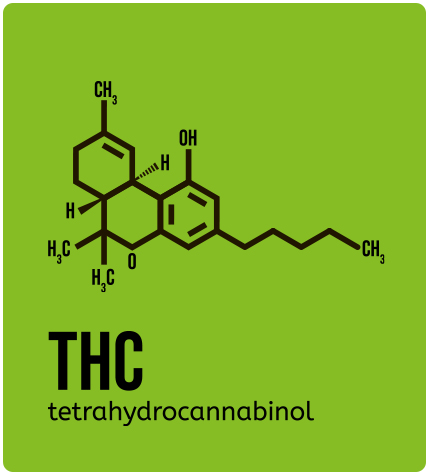
THC
tetrahydrocannabinol
Science:
Tetrahydrocannabinol (THC) is the primary psychoactive compound in cannabis that produces a high sensation. CBD and THC have the same molecular structure: 21 carbon atoms, 30 hydrogen atoms, and 2 oxygen atoms. A slight difference in how the atoms are arranged accounts for the differing effects on your body. Like CBD, THC interacts with the body’s endocannabinoid system, but they have very different psychoactive effects. THC binds with the cannabinoid 1 (CB1) receptors in the brain. As a result, it produces a high or sense of euphoria.
Benefits:
- Pain
- Muscle spasticity
- Glaucoma
- Insomnia
- Low appetite
- Nausea
- Anxiety
Tetrahydrocannabinol (THC) is the primary psychoactive compound in cannabis that produces a high sensation. CBD and THC have the same molecular structure: 21 carbon atoms, 30 hydrogen atoms, and 2 oxygen atoms. A slight difference in how the atoms are arranged accounts for the differing effects on your body. Like CBD, THC interacts with the body’s endocannabinoid system, but they have very different psychoactive effects. THC binds with the cannabinoid 1 (CB1) receptors in the brain. As a result, it produces a high or sense of euphoria.
– Pain
– Muscle spasticity
– Glaucoma
– Insomnia
– Low appetite
– Nausea
– Anxiety
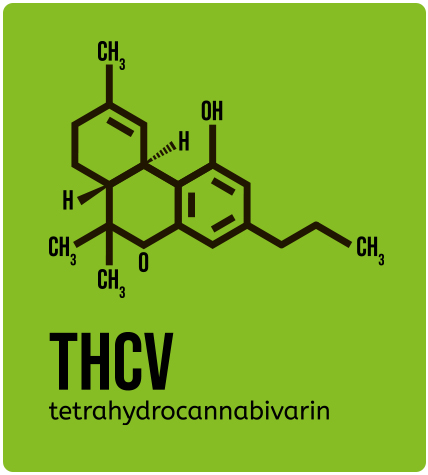
THCV
tetrahydrocannabivarin
Science:
Tetrahydrocannabivarin (THCV) is a compound in cannabis that offers a unique array of effects and medical benefits that sets it apart from other cannabinoids like THC and CBD. As a result, THCV is fast becoming one of the latest cannabinoids on the market. THCV is also called “diet weed” for its purported appetite-curbing and energy-boosting properties.
Benefits:
- Appetite suppressant: In contrast to THC, THCV may dull the appetite. This may be good for consumers focused on weight loss, but THCV should be avoided by patients treating appetite loss or anorexia.
- May help with diabetes: Research shows promise in THCV’s ability to regulate blood sugar levels and reduce insulin resistance.
- May reduce panic attacks: It appears to curb anxiety attacks in PTSD patients without suppressing emotion.
- May help with Alzheimer’s: Tremors, motor control, and brain lesions associated with Alzheimer’s disease appear to be improved by THCV, but research is in progress.
- Stimulates bone growth: Because it promotes the growth of new bone cells, THCV is being looked at for osteoporosis and other bone-related conditions.
Tetrahydrocannabivarin (THCV) is a compound in cannabis that offers a unique array of effects and medical benefits that sets it apart from other cannabinoids like THC and CBD. As a result, THCV is fast becoming one of the latest cannabinoids on the market. THCV is also called “diet weed” for its purported appetite-curbing and energy-boosting properties.
– Appetite suppressant: In contrast to THC, THCV may dull the appetite. This may be good for consumers focused on weight loss, but THCV should be avoided by patients treating appetite loss or anorexia.
– May help with diabetes: Research shows promise in THCV’s ability to regulate blood sugar levels and reduce insulin resistance.
– May reduce panic attacks: It appears to curb anxiety attacks in PTSD patients without suppressing emotion.
– May help with Alzheimer’s: Tremors, motor control, and brain lesions associated with Alzheimer’s disease appear to be improved by THCV, but research is in progress.
– Stimulates bone growth: Because it promotes the growth of new bone cells, THCV is being looked at for osteoporosis and other bone-related conditions.
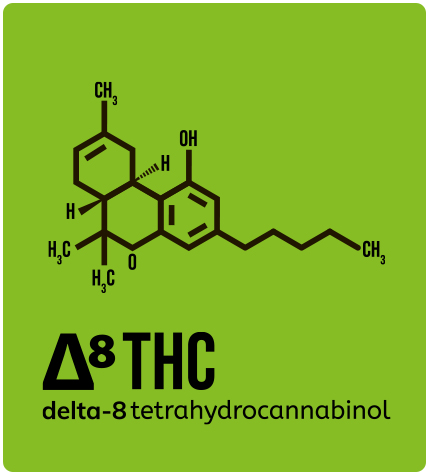
Delta-8 THC
delta-8 tetrahydrocannabinol
Science:
Tetrahydrocannabinol delta- 8 (Delta 8 THC) is one of the many cannabinoids secreted by cannabis plants that produces a “high.” Delta 8 THC can make you feel relaxed and clear-headed — while still offering all the benefits of the THC experience. Delta 8 THC occurs in very low concentrations in CBD hemp flower (less than 1%). However, modern extraction methods have discovered methods of isolating this cannabinoid from federally legal hemp. Delta 8 is Structurally similar to delta 9 THC — the active ingredient in marijuana — delta 8 offers the same characteristic effects but with fewer side effects.
Benefits:
There’s also a lack of research and evidence regarding Delta-8’s impact on your overall health. Many people have reported using Delta-8 along with their prescription medications to help with depression and substance use. Users say Delta-8 can also:
- Calm nausea
- Boost appetite
- Ease pain relief
- Boost mental health
- Prevent vomiting during cancer treatments
Tetrahydrocannabinol delta- 8 (Delta 8 THC) is one of the many cannabinoids secreted by cannabis plants that produces a “high.” Delta 8 THC can make you feel relaxed and clear-headed — while still offering all the benefits of the THC experience. Delta 8 THC occurs in very low concentrations in CBD hemp flower (less than 1%). However, modern extraction methods have discovered methods of isolating this cannabinoid from federally legal hemp. Delta 8 is Structurally similar to delta 9 THC — the active ingredient in marijuana — delta 8 offers the same characteristic effects but with fewer side effects.
There’s also a lack of research and evidence regarding Delta-8’s impact on your overall health. Many people have reported using Delta-8 along with their prescription medications to help with depression and substance use. Users say Delta-8 can also:
– Calm nausea
– Boost appetite
– Ease pain relief
– Boost mental health
– Prevent vomiting during cancer treatments
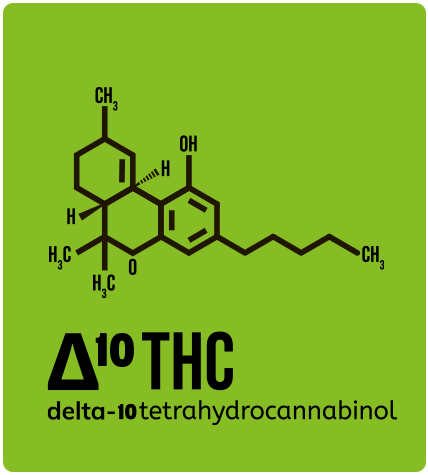
Delta-10 THC
delta-10 tetrahydrocannabinol
Science:
Tetrahydrocannabinol delta-10 (Delta 10 THC) is the newest cannabinoid to hit the markets that helps relieve stress and tension while not causing intense feelings of paranoia, anxiety, or psychoactive effects; As a result, Delta 10 THC has been researched for use as a medication because of its mild effects. Curiosity is the mother of inventions. But, accidents form various interesting discoveries for humankind. The same is the case with Delta 10 THC. An accident in the cultivation farm gave rise to the fire. The department discovered a product when it tried to mitigate the California wildfires. Researchers and scientists, after a thorough investigation, developed Delta 10 THC.
Delta 10 THC is commonly used in states where medical marijuana isn’t legal.
Benefits:
Delta 10 has a lower potency than its predecessor. Therefore, it interacts with both the CB1 and CB2 receptors and thus is not psychoactive as its predecessors but instead has a more euphoric and nootropic effect.
- Neuroprotective Properties: Delta 10 is an isomer of Delta 8 THC. Therefore, it possesses similar neuroprotective properties. It can aid in memory-related issues, cognition, and neuroplasticity, thus ensuring a healthier brain.
- Appetite Stimulator: Delta 10 THC helps stimulate the appetite of an individual. Due to its interaction with the body’s endocannabinoid system, it aids in maintaining numerous such functions.
- Increase Energy Levels: Delta 10 THC offers a Sativa high sensation. You enjoy a soothing and relaxing experience and boost your energy levels, and thus can help you stay active, focused, and energized throughout the day.
- Pain Relief: Delta 10 THC can help deal with pain like other cannabinoids.
Stress and Anxiety – Delta 10 THC affects the limbic system and thus can help in dealing with conditions like anxiety, post-traumatic stress disorder, etc.
Tetrahydrocannabinol delta-10 (Delta 10 THC) is the newest cannabinoid to hit the markets that helps relieve stress and tension while not causing intense feelings of paranoia, anxiety, or psychoactive effects; As a result, Delta 10 THC has been researched for use as a medication because of its mild effects. Curiosity is the mother of inventions. But, accidents form various interesting discoveries for humankind. The same is the case with Delta 10 THC. An accident in the cultivation farm gave rise to the fire. The department discovered a product when it tried to mitigate the California wildfires. Researchers and scientists, after a thorough investigation, developed Delta 10 THC.
Delta 10 THC is commonly used in states where medical marijuana isn’t legal.
Delta 10 has a lower potency than its predecessor. Therefore, it interacts with both the CB1 and CB2 receptors and thus is not psychoactive as its predecessors but instead has a more euphoric and nootropic effect.
– Neuroprotective Properties: Delta 10 is an isomer of Delta 8 THC. Therefore, it possesses similar neuroprotective properties. It can aid in memory-related issues, cognition, and neuroplasticity, thus ensuring a healthier brain.
– Appetite Stimulator: Delta 10 THC helps stimulate the appetite of an individual. Due to its interaction with the body’s endocannabinoid system, it aids in maintaining numerous such functions.
– Increase Energy Levels: Delta 10 THC offers a Sativa high sensation. You enjoy a soothing and relaxing experience and boost your energy levels, and thus can help you stay active, focused, and energized throughout the day.
– Pain Relief: Delta 10 THC can help deal with pain like other cannabinoids.
Stress and Anxiety – Delta 10 THC affects the limbic system and thus can help in dealing with conditions like anxiety, post-traumatic stress disorder, etc.


SHOP OPEN HOURS
Monday – Friday: 9am – 5pm EST
Saturday & Sunday: closed
Phone (931)-863-5197
FDA Registration #: 11652816088
* These statements have not been evaluated by the Food and Drug Administration. These products are not intended to diagnose, treat, cure or prevent any disease. Products contain less than 0.3% THC on a dry weight basis. This Product is not for use by or sale to persons under the age of 21.
B2B
Pages
Categories
© Copyright 2022 by Hempuniverse | Zelle Farms, TN, United States


